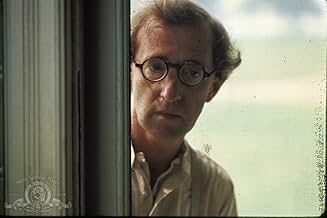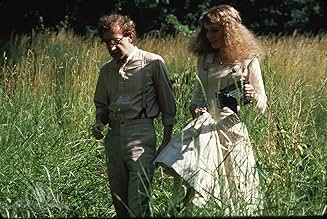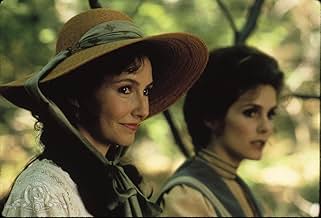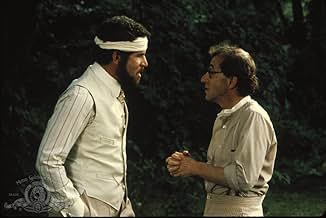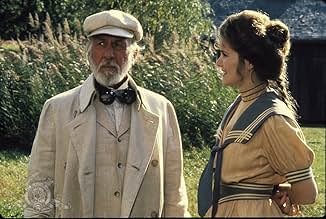IMDb-BEWERTUNG
6,6/10
21.479
IHRE BEWERTUNG
Ein exzentrischer Erfinder und seine Frau laden in den 1900er-Jahren zwei andere Paare zu einer Wochenendparty in ein romantisches Sommerhaus auf dem Land ein.Ein exzentrischer Erfinder und seine Frau laden in den 1900er-Jahren zwei andere Paare zu einer Wochenendparty in ein romantisches Sommerhaus auf dem Land ein.Ein exzentrischer Erfinder und seine Frau laden in den 1900er-Jahren zwei andere Paare zu einer Wochenendparty in ein romantisches Sommerhaus auf dem Land ein.
- Auszeichnungen
- 1 Nominierung insgesamt
José Ferrer
- Leopold
- (as Jose Ferrer)
Sandy Biano
- Nurse
- (Nicht genannt)
Caitlin O'Heaney
- Dolores Farrar
- (Nicht genannt)
Empfohlene Bewertungen
First,i should say that i am an inconditional Woody Allen fan. I saw this movie for the first time yesterday and i had a GREAT time! Tony Roberts is just great in that one! I wonder why Woody did'nt cast him more often? I won't give you the plot as you already know it. I'll just add that A Midsummer Night's Sex Comedy is a different Woody Allen film. This time he focus on the country in is beautifulness instead of the more common urban movie he used to shoot. And that gives this movie something unique compared to Woody's other works. The jokes and the situations are very funny and i laughed a lot! So if you are a Woody Allen fan and haven't seen that one,forget about all the bad words that movie got and enjoy a realy entertaining viewing!
Cute and charming, if not really much more.
Gordon Willis's photography is nowhere near as amazing as his earlier collaborations with Woody, and the film doesn't have any wildly funny moments.
But the writing is witty, and the acting solid if not triumphant. It just doesn't feel like a Woody Allen film somehow. More like a nice, solid, unassuming French farce.
That's not a bad thing, and this film is still better than 99% of what comes out of Hollywood, with a sweeter, more upbeat tone than usual for Allen. It's just coming on the heels of masterpieces like 'Annie Hall', 'Manhattan', and 'Stardust Memories', and just before other great films like 'Zelig' and 'Purple Rose of Cairo', it can't help but pale a bit in comparison.
Gordon Willis's photography is nowhere near as amazing as his earlier collaborations with Woody, and the film doesn't have any wildly funny moments.
But the writing is witty, and the acting solid if not triumphant. It just doesn't feel like a Woody Allen film somehow. More like a nice, solid, unassuming French farce.
That's not a bad thing, and this film is still better than 99% of what comes out of Hollywood, with a sweeter, more upbeat tone than usual for Allen. It's just coming on the heels of masterpieces like 'Annie Hall', 'Manhattan', and 'Stardust Memories', and just before other great films like 'Zelig' and 'Purple Rose of Cairo', it can't help but pale a bit in comparison.
When I look at his filmography on this site and count the films I consider great from the 70s till the early 90s I only stumble over two or three entries I am not fond of. Granted, some are greater than others, but Woody Allen essentially created consistently excellent films for two decades. Whether comedy or drama, whether set in New York or elsewhere, his films are not only great American films, but they belong in the international arena of film art.
Having said all that, and hopefully having disclosed my own bias in discussing the man's work, I can say without further ado that I loved "A Midsummer Night's Sex Comedy." It is hardly the type of Woody Allen film that would receive dozens of critical accolades and nominations (in fact it was only nominated for a Razzie), but I think that can be explained by the fact that Woody Allen set a bar of expectation for himself. When you watch "Manhattan" or "Crimes and Misdemeanors" and then this you see a change of pace, a sort of lighter tone. That does not, however, mean that this film is without its merits. Taken strictly as a film, not as a Woody Allen film, it is plain wonderful. I think that goes for most of his films (except maybe some of the more recent ones).
Allen, of course, is up to his usual tricks again - he takes a Bergman film ("Smiles of a Summer Night") and spoofs it, makes it his own and I think successfully. The atmosphere of this film is what makes it so watchable - the beautiful blend of humor, nostalgia and unfulfilled desire, which I think he perfected in "Radio Days," come through exquisitely. It's also an interesting move away from the stark atheism, or at least agnosticism of his earlier films - the presence of spirits, shadows and ghosts, things unexplained by science, unaccounted for by our sentient experience.
The most interesting aspect of it is that this mystical theme is hardly incongruous with Allen's other films, including his tragedies. Whether his films underline the hopelessness of existence (like "Interiors") or the mystical, and thus hopeful nature of human relationships, they only differ by the mood the storyteller is in when he speaks of them.
Here we have an entirely Shakespearean comedy full of criss-crossing love affairs, absurd relations, untamed desires all leading to hilarious revelations, or serious revelations under the most comic circumstances. Jose Ferrer is remarkable as Professor Leopold, a cold, atheistic intellectual, an accomplished thinker and professor. Contrary to his character, Allen bestows him with some of the funniest lines in the entire film. For example, when he realizes that his marriage to Mia Farrow's Ariel will be the end of his bachelorhood and that he is attracted to Julie Hagerty's nurse Dulcy, he attempts to compliment Dulcy over a game of chess. He says: "You have a wonderful flair for spatial relationships." These little speeches are completely in line with the comic absurdity of the whole, like Tony Robert's Maxwell, a romantic doctor who, gets shot not once, but twice in the film (once for love and once for revenge {meant for someone else}, nonetheless), or Woody Allen's stockbroker / inventor Andrew.
There is such joy in this film, such passion. Yes, maybe "Radio Days" is more articulate and personal on the subject, maybe "Crimes and Misdemeanors" is one of his best tragedies, "Manhattan" one of my favorite of his films along with "Hannah and Her Sisters" and "Another Woman." And, while "A Midsummer Night's Sex Comedy" is not as great, in my humble opinion, as the aforementioned films, it is still a great film, if that makes any sense.
Having said all that, and hopefully having disclosed my own bias in discussing the man's work, I can say without further ado that I loved "A Midsummer Night's Sex Comedy." It is hardly the type of Woody Allen film that would receive dozens of critical accolades and nominations (in fact it was only nominated for a Razzie), but I think that can be explained by the fact that Woody Allen set a bar of expectation for himself. When you watch "Manhattan" or "Crimes and Misdemeanors" and then this you see a change of pace, a sort of lighter tone. That does not, however, mean that this film is without its merits. Taken strictly as a film, not as a Woody Allen film, it is plain wonderful. I think that goes for most of his films (except maybe some of the more recent ones).
Allen, of course, is up to his usual tricks again - he takes a Bergman film ("Smiles of a Summer Night") and spoofs it, makes it his own and I think successfully. The atmosphere of this film is what makes it so watchable - the beautiful blend of humor, nostalgia and unfulfilled desire, which I think he perfected in "Radio Days," come through exquisitely. It's also an interesting move away from the stark atheism, or at least agnosticism of his earlier films - the presence of spirits, shadows and ghosts, things unexplained by science, unaccounted for by our sentient experience.
The most interesting aspect of it is that this mystical theme is hardly incongruous with Allen's other films, including his tragedies. Whether his films underline the hopelessness of existence (like "Interiors") or the mystical, and thus hopeful nature of human relationships, they only differ by the mood the storyteller is in when he speaks of them.
Here we have an entirely Shakespearean comedy full of criss-crossing love affairs, absurd relations, untamed desires all leading to hilarious revelations, or serious revelations under the most comic circumstances. Jose Ferrer is remarkable as Professor Leopold, a cold, atheistic intellectual, an accomplished thinker and professor. Contrary to his character, Allen bestows him with some of the funniest lines in the entire film. For example, when he realizes that his marriage to Mia Farrow's Ariel will be the end of his bachelorhood and that he is attracted to Julie Hagerty's nurse Dulcy, he attempts to compliment Dulcy over a game of chess. He says: "You have a wonderful flair for spatial relationships." These little speeches are completely in line with the comic absurdity of the whole, like Tony Robert's Maxwell, a romantic doctor who, gets shot not once, but twice in the film (once for love and once for revenge {meant for someone else}, nonetheless), or Woody Allen's stockbroker / inventor Andrew.
There is such joy in this film, such passion. Yes, maybe "Radio Days" is more articulate and personal on the subject, maybe "Crimes and Misdemeanors" is one of his best tragedies, "Manhattan" one of my favorite of his films along with "Hannah and Her Sisters" and "Another Woman." And, while "A Midsummer Night's Sex Comedy" is not as great, in my humble opinion, as the aforementioned films, it is still a great film, if that makes any sense.
A MIDSUMMER NIGHT'S SEX COMEDY was Woody Allen's amusing variation on the Ingmar Bergman classic SMILES OF A SUMMER NIGHT, which had been previously re-worked as a Broadway musical by Stephen Sondheim called A LITTLE NIGHT MUSIC. This film is about three couples in turn of the century who gather at one of their country homes for the weekend and it is clear at the beginning of the story that these three couples are hopelessly mismatched and we see the very human foibles that split up and mix up these three couples during this memorable weekend in the country. Woody and Mary Steenburgen plays the hosts for the weekend, a seemingly happily married couple whose happiness is clearly surface deep. Tony Roberts plays a womanizing physician and Woody's best pal who arrives for the weekend with his nurse (Julia Hagerty). In her first screen pairing with Woody Allen, Mia Farrow plays a former flame of Woody's who has arrived with her much older fiancée (Jose Ferrer) who she is scheduled to marry on Monday. Watching these three couples fuss and fumble all over each other in an attempt to be with the person they really want to be with is what makes this charming period comedy work. As always in Woody's films, music is crucial in setting the mood and Woody has chosen some classic Mendelsohhn pieces that set the perfect mood for the piece. The performances are uniformly fine, with Roberts a standout. Not one of Woody's better known films, but if you'd like to see where his relationship with Mia began, take a look.
While this movie is not considered to be one of Woody Allen's masterworks, the sight of him in the countryside he so feared in Annie Hall and Manhattan, surrounded by crickets, rabbits, frogs and wild mushrooms, is a funny one, especially for his fans. Shakespeare was clearly on Allen's mind when he made and titled this movie--not only A Midsummer Night's Dream, but also The Tempest. There are obvious references (Mia Farrow's character's name is Ariel), and more subtle ones in the dialogue, when Woody's character talks about a "half goat" mystical lover. The film also marks Allen's first union with Mia Farrow, and the two work wonders together here which would be proved in several subsequent films (it's quite sad that their off-screen relationship ended the way it did). It is beautifully filmed and Allen uses music as effectively as he did in Manhattan. There are not a lot of belly laughs or memorable one-liners, but it is fun to watch nevertheless, and everyone in his ensemble cast seems to be having a great time.
Wusstest du schon
- WissenswertesJosé Ferrer found himself the object of a practical joke while making this film. Dustin Hoffman visited the set while made up as Dorothy Michaels in the film Tootsie (1982), and proceeded to make sexual advances on Ferrer, who politely refused--but was completely unaware that Hoffman was not in fact a woman.
- PatzerAbout thirteen minutes into the movie, a crew member is visible crouched by a tree, as a deer runs through the woods.
- SoundtracksSymphony No. 3 (Scottish) in A Minor
Written by Felix Mendelssohn (as Mendelssohn)
Performed by Leonard Bernstein and the New York Philharmonic (as New York Philharmonic Orchestra)
Courtesy of CBS Records
Top-Auswahl
Melde dich zum Bewerten an und greife auf die Watchlist für personalisierte Empfehlungen zu.
- How long is A Midsummer Night's Sex Comedy?Powered by Alexa
Details
- Erscheinungsdatum
- Herkunftsland
- Sprachen
- Auch bekannt als
- Comedia sexual de una noche de verano
- Drehorte
- Produktionsfirmen
- Weitere beteiligte Unternehmen bei IMDbPro anzeigen
Box Office
- Bruttoertrag in den USA und Kanada
- 9.077.269 $
- Eröffnungswochenende in den USA und in Kanada
- 2.514.478 $
- 18. Juli 1982
- Weltweiter Bruttoertrag
- 9.077.269 $
Zu dieser Seite beitragen
Bearbeitung vorschlagen oder fehlenden Inhalt hinzufügen

Oberste Lücke
What is the Brazilian Portuguese language plot outline for Eine Sommernachts-Sexkomödie (1982)?
Antwort


